Business Law Report: Analysis of UK Legal System and Contracts
VerifiedAdded on 2024/05/17
|21
|4244
|255
Report
AI Summary
This report provides a comprehensive overview of the UK legal system, analyzing its structure, sources of law, and the roles of different legal entities. It explores the constitution, separation of powers, legislative processes, and judicial review mechanisms. The report delves into international sources of law, the court hierarchy, and specialist courts. Furthermore, it examines key areas of business law, including contract, company, and employment law, along with emergency powers and human rights protection. The report also includes comparisons between the UK and US legal systems, and discusses different forms of regulations, legislation, and standards. Finally, it covers the concept of contract termination, the role of the employer and employee, and the legal implications of these actions. This report is a valuable resource for students studying business law, offering detailed explanations and practical examples to enhance understanding of the UK legal framework.
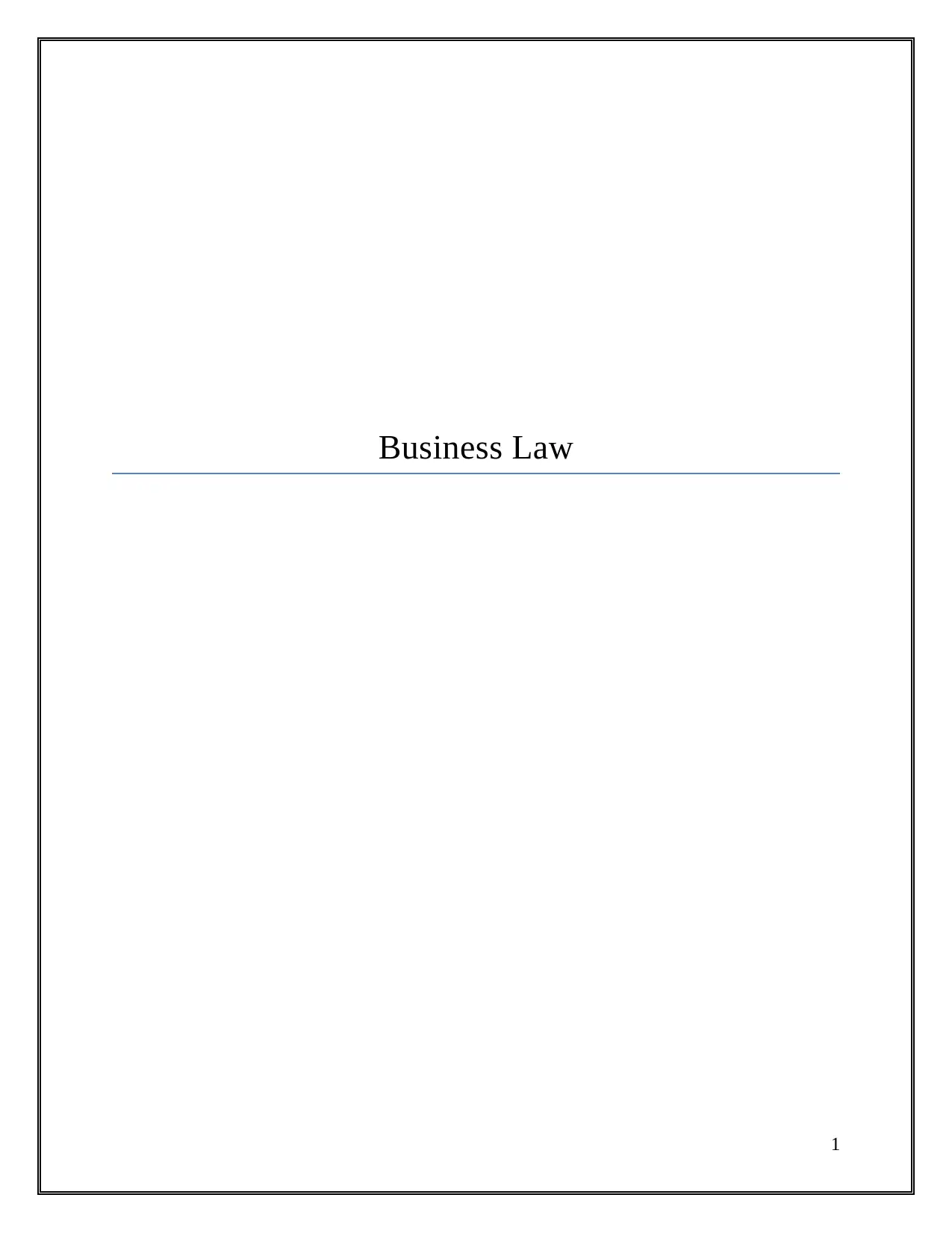
Business Law
1
1
Paraphrase This Document
Need a fresh take? Get an instant paraphrase of this document with our AI Paraphraser
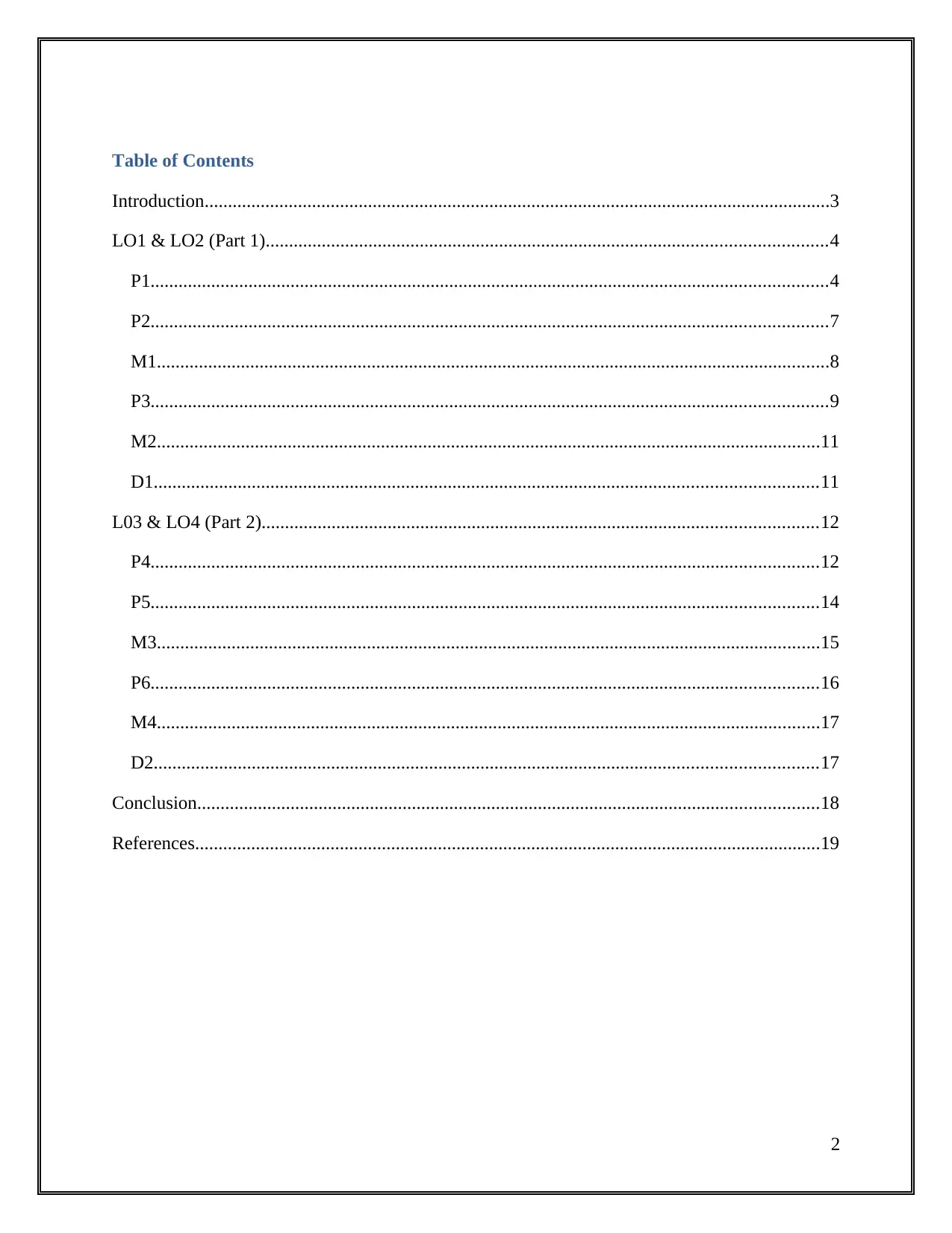
Table of Contents
Introduction......................................................................................................................................3
LO1 & LO2 (Part 1)........................................................................................................................4
P1.................................................................................................................................................4
P2.................................................................................................................................................7
M1................................................................................................................................................8
P3.................................................................................................................................................9
M2..............................................................................................................................................11
D1..............................................................................................................................................11
L03 & LO4 (Part 2).......................................................................................................................12
P4...............................................................................................................................................12
P5...............................................................................................................................................14
M3..............................................................................................................................................15
P6...............................................................................................................................................16
M4..............................................................................................................................................17
D2..............................................................................................................................................17
Conclusion.....................................................................................................................................18
References......................................................................................................................................19
2
Introduction......................................................................................................................................3
LO1 & LO2 (Part 1)........................................................................................................................4
P1.................................................................................................................................................4
P2.................................................................................................................................................7
M1................................................................................................................................................8
P3.................................................................................................................................................9
M2..............................................................................................................................................11
D1..............................................................................................................................................11
L03 & LO4 (Part 2).......................................................................................................................12
P4...............................................................................................................................................12
P5...............................................................................................................................................14
M3..............................................................................................................................................15
P6...............................................................................................................................................16
M4..............................................................................................................................................17
D2..............................................................................................................................................17
Conclusion.....................................................................................................................................18
References......................................................................................................................................19
2
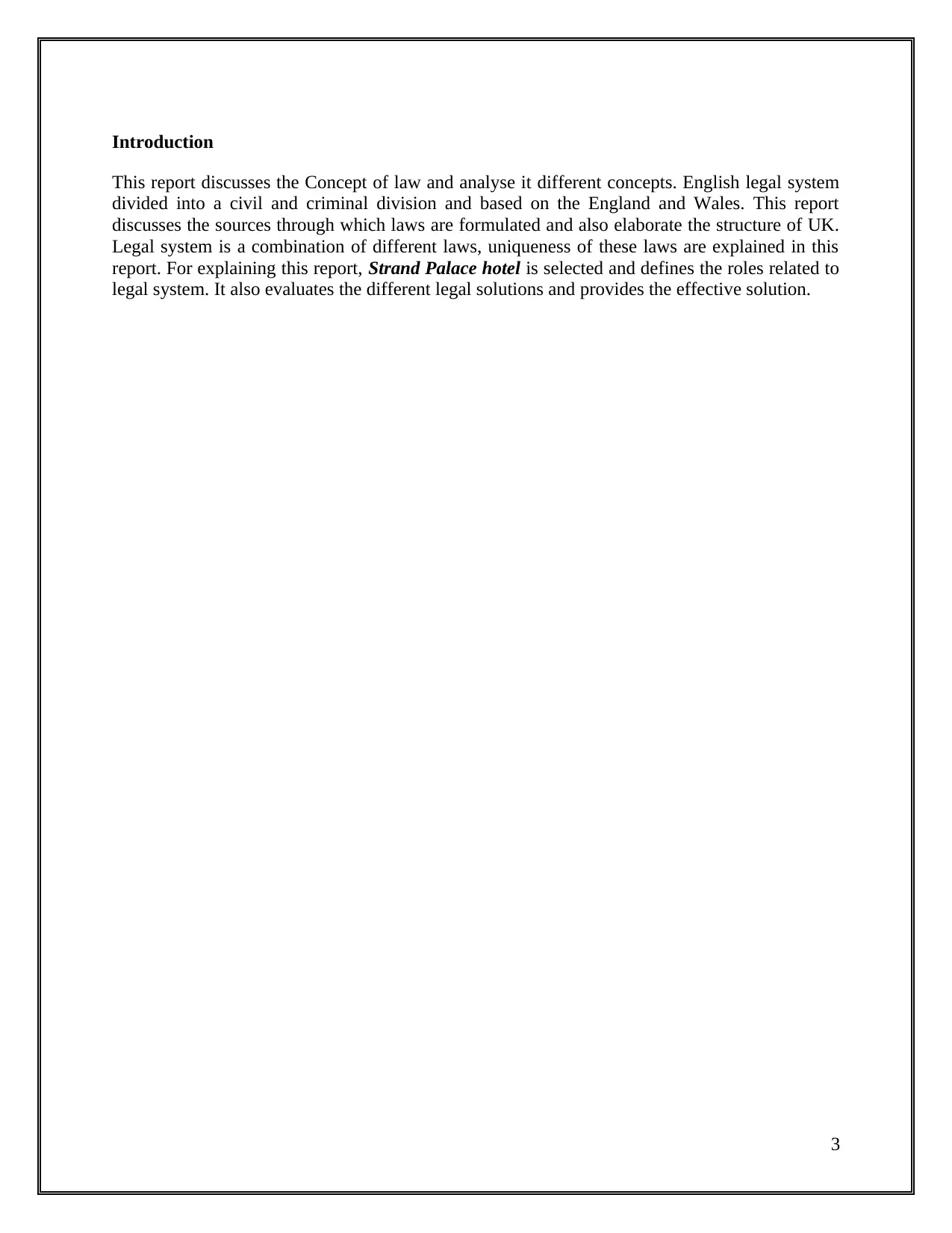
Introduction
This report discusses the Concept of law and analyse it different concepts. English legal system
divided into a civil and criminal division and based on the England and Wales. This report
discusses the sources through which laws are formulated and also elaborate the structure of UK.
Legal system is a combination of different laws, uniqueness of these laws are explained in this
report. For explaining this report, Strand Palace hotel is selected and defines the roles related to
legal system. It also evaluates the different legal solutions and provides the effective solution.
3
This report discusses the Concept of law and analyse it different concepts. English legal system
divided into a civil and criminal division and based on the England and Wales. This report
discusses the sources through which laws are formulated and also elaborate the structure of UK.
Legal system is a combination of different laws, uniqueness of these laws are explained in this
report. For explaining this report, Strand Palace hotel is selected and defines the roles related to
legal system. It also evaluates the different legal solutions and provides the effective solution.
3
⊘ This is a preview!⊘
Do you want full access?
Subscribe today to unlock all pages.

Trusted by 1+ million students worldwide
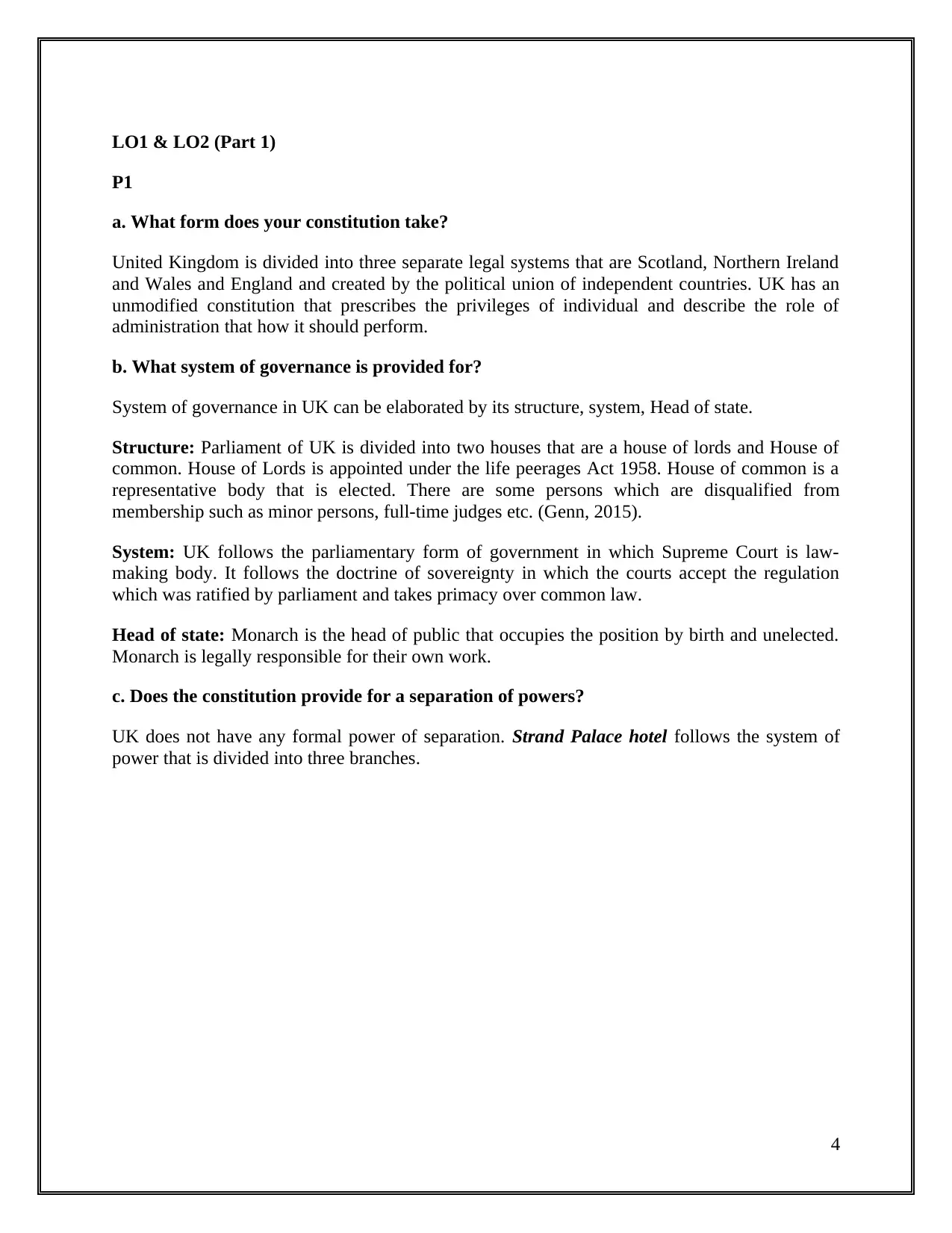
LO1 & LO2 (Part 1)
P1
a. What form does your constitution take?
United Kingdom is divided into three separate legal systems that are Scotland, Northern Ireland
and Wales and England and created by the political union of independent countries. UK has an
unmodified constitution that prescribes the privileges of individual and describe the role of
administration that how it should perform.
b. What system of governance is provided for?
System of governance in UK can be elaborated by its structure, system, Head of state.
Structure: Parliament of UK is divided into two houses that are a house of lords and House of
common. House of Lords is appointed under the life peerages Act 1958. House of common is a
representative body that is elected. There are some persons which are disqualified from
membership such as minor persons, full-time judges etc. (Genn, 2015).
System: UK follows the parliamentary form of government in which Supreme Court is law-
making body. It follows the doctrine of sovereignty in which the courts accept the regulation
which was ratified by parliament and takes primacy over common law.
Head of state: Monarch is the head of public that occupies the position by birth and unelected.
Monarch is legally responsible for their own work.
c. Does the constitution provide for a separation of powers?
UK does not have any formal power of separation. Strand Palace hotel follows the system of
power that is divided into three branches.
4
P1
a. What form does your constitution take?
United Kingdom is divided into three separate legal systems that are Scotland, Northern Ireland
and Wales and England and created by the political union of independent countries. UK has an
unmodified constitution that prescribes the privileges of individual and describe the role of
administration that how it should perform.
b. What system of governance is provided for?
System of governance in UK can be elaborated by its structure, system, Head of state.
Structure: Parliament of UK is divided into two houses that are a house of lords and House of
common. House of Lords is appointed under the life peerages Act 1958. House of common is a
representative body that is elected. There are some persons which are disqualified from
membership such as minor persons, full-time judges etc. (Genn, 2015).
System: UK follows the parliamentary form of government in which Supreme Court is law-
making body. It follows the doctrine of sovereignty in which the courts accept the regulation
which was ratified by parliament and takes primacy over common law.
Head of state: Monarch is the head of public that occupies the position by birth and unelected.
Monarch is legally responsible for their own work.
c. Does the constitution provide for a separation of powers?
UK does not have any formal power of separation. Strand Palace hotel follows the system of
power that is divided into three branches.
4
Paraphrase This Document
Need a fresh take? Get an instant paraphrase of this document with our AI Paraphraser
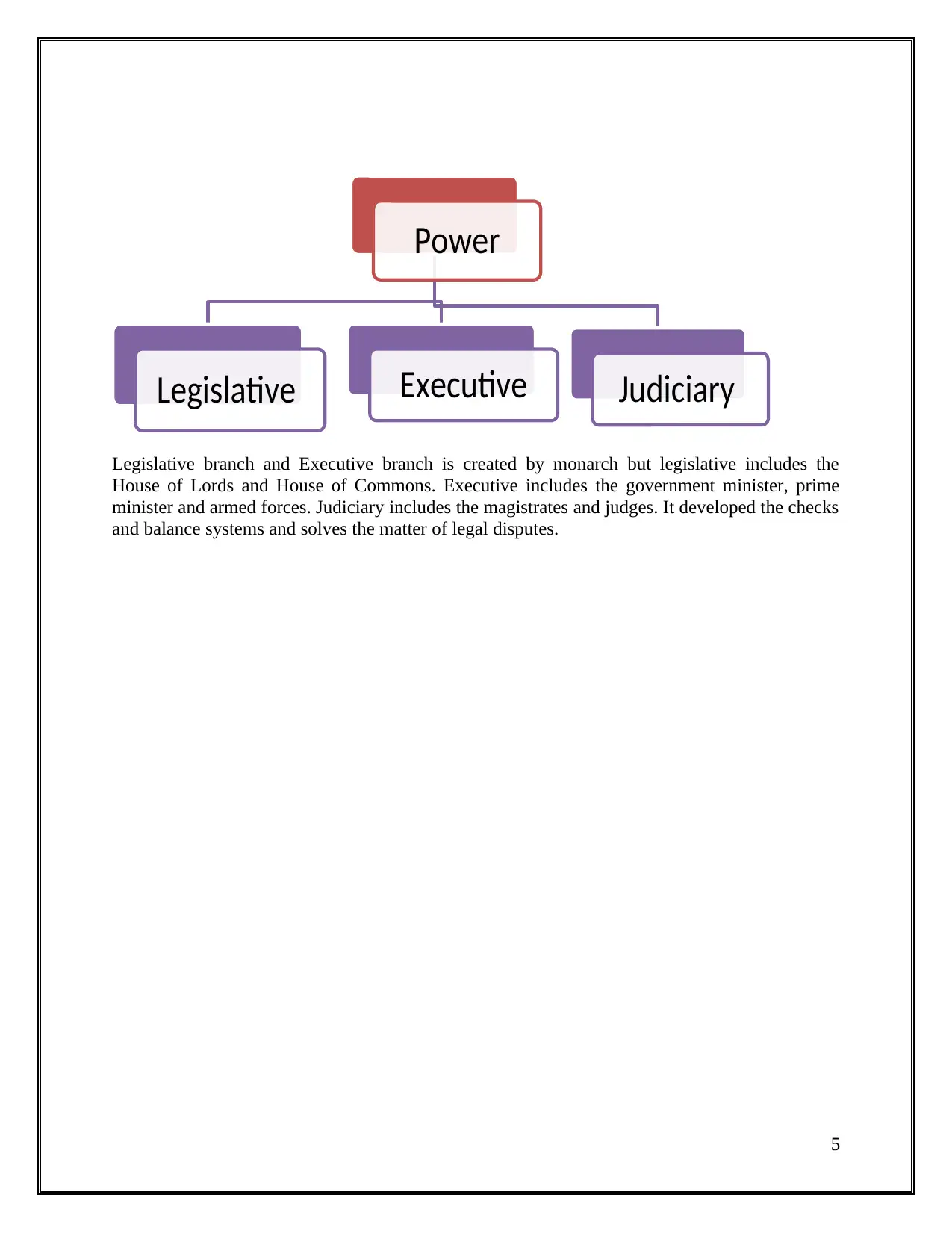
Legislative branch and Executive branch is created by monarch but legislative includes the
House of Lords and House of Commons. Executive includes the government minister, prime
minister and armed forces. Judiciary includes the magistrates and judges. It developed the checks
and balance systems and solves the matter of legal disputes.
5
Power
Legislative Executive Judiciary
House of Lords and House of Commons. Executive includes the government minister, prime
minister and armed forces. Judiciary includes the magistrates and judges. It developed the checks
and balance systems and solves the matter of legal disputes.
5
Power
Legislative Executive Judiciary
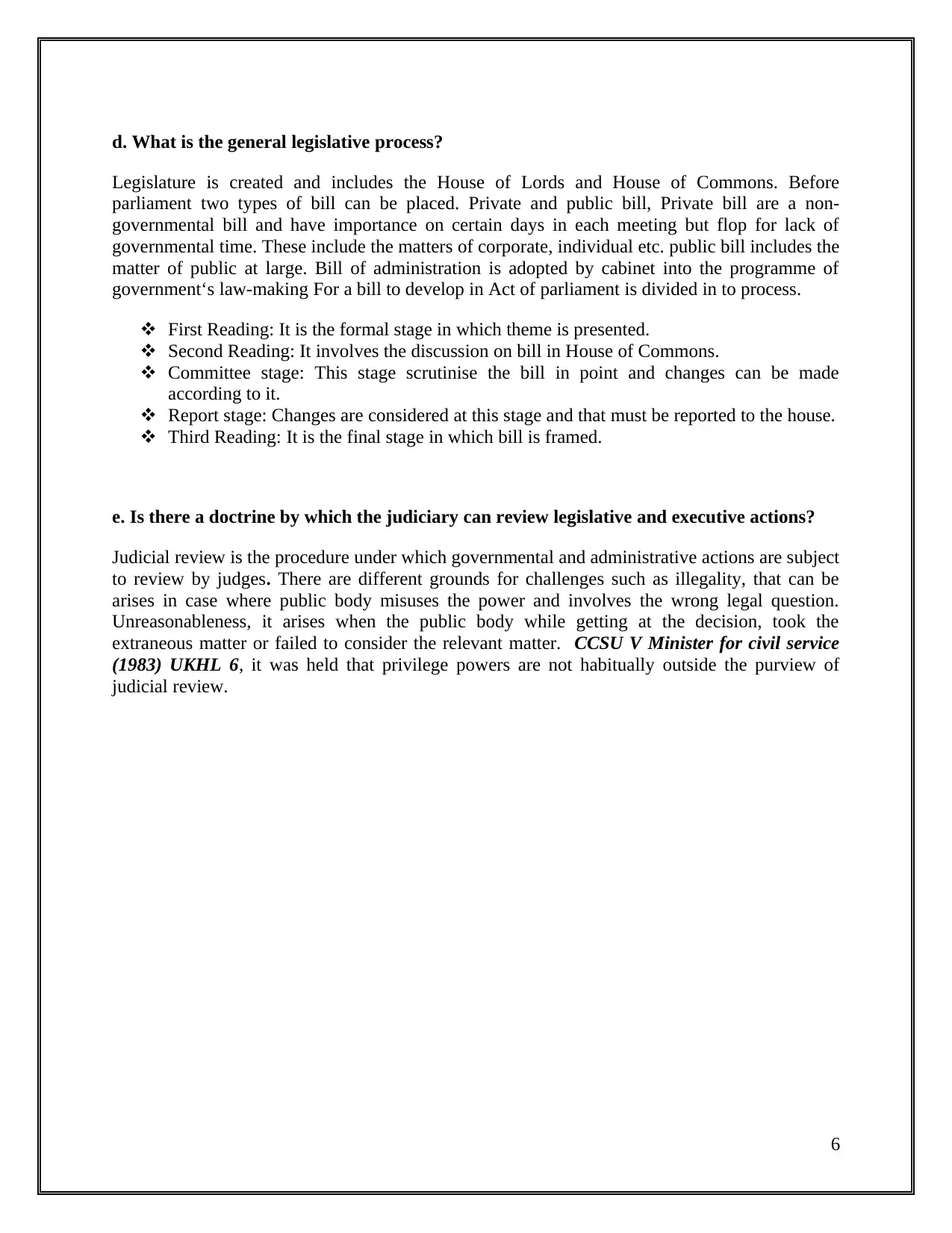
d. What is the general legislative process?
Legislature is created and includes the House of Lords and House of Commons. Before
parliament two types of bill can be placed. Private and public bill, Private bill are a non-
governmental bill and have importance on certain days in each meeting but flop for lack of
governmental time. These include the matters of corporate, individual etc. public bill includes the
matter of public at large. Bill of administration is adopted by cabinet into the programme of
government‘s law-making For a bill to develop in Act of parliament is divided in to process.
First Reading: It is the formal stage in which theme is presented.
Second Reading: It involves the discussion on bill in House of Commons.
Committee stage: This stage scrutinise the bill in point and changes can be made
according to it.
Report stage: Changes are considered at this stage and that must be reported to the house.
Third Reading: It is the final stage in which bill is framed.
e. Is there a doctrine by which the judiciary can review legislative and executive actions?
Judicial review is the procedure under which governmental and administrative actions are subject
to review by judges. There are different grounds for challenges such as illegality, that can be
arises in case where public body misuses the power and involves the wrong legal question.
Unreasonableness, it arises when the public body while getting at the decision, took the
extraneous matter or failed to consider the relevant matter. CCSU V Minister for civil service
(1983) UKHL 6, it was held that privilege powers are not habitually outside the purview of
judicial review.
6
Legislature is created and includes the House of Lords and House of Commons. Before
parliament two types of bill can be placed. Private and public bill, Private bill are a non-
governmental bill and have importance on certain days in each meeting but flop for lack of
governmental time. These include the matters of corporate, individual etc. public bill includes the
matter of public at large. Bill of administration is adopted by cabinet into the programme of
government‘s law-making For a bill to develop in Act of parliament is divided in to process.
First Reading: It is the formal stage in which theme is presented.
Second Reading: It involves the discussion on bill in House of Commons.
Committee stage: This stage scrutinise the bill in point and changes can be made
according to it.
Report stage: Changes are considered at this stage and that must be reported to the house.
Third Reading: It is the final stage in which bill is framed.
e. Is there a doctrine by which the judiciary can review legislative and executive actions?
Judicial review is the procedure under which governmental and administrative actions are subject
to review by judges. There are different grounds for challenges such as illegality, that can be
arises in case where public body misuses the power and involves the wrong legal question.
Unreasonableness, it arises when the public body while getting at the decision, took the
extraneous matter or failed to consider the relevant matter. CCSU V Minister for civil service
(1983) UKHL 6, it was held that privilege powers are not habitually outside the purview of
judicial review.
6
⊘ This is a preview!⊘
Do you want full access?
Subscribe today to unlock all pages.

Trusted by 1+ million students worldwide
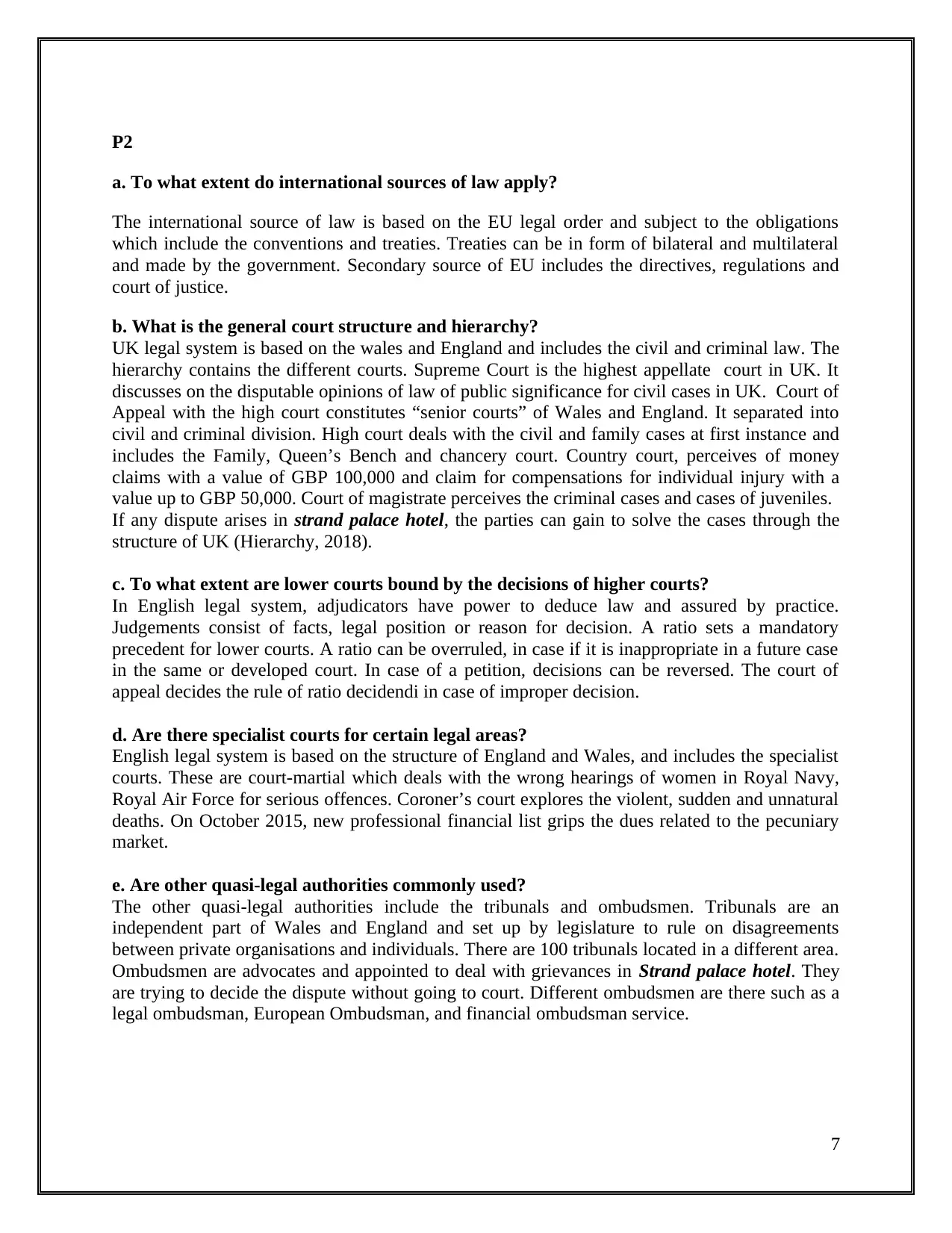
P2
a. To what extent do international sources of law apply?
The international source of law is based on the EU legal order and subject to the obligations
which include the conventions and treaties. Treaties can be in form of bilateral and multilateral
and made by the government. Secondary source of EU includes the directives, regulations and
court of justice.
b. What is the general court structure and hierarchy?
UK legal system is based on the wales and England and includes the civil and criminal law. The
hierarchy contains the different courts. Supreme Court is the highest appellate court in UK. It
discusses on the disputable opinions of law of public significance for civil cases in UK. Court of
Appeal with the high court constitutes “senior courts” of Wales and England. It separated into
civil and criminal division. High court deals with the civil and family cases at first instance and
includes the Family, Queen’s Bench and chancery court. Country court, perceives of money
claims with a value of GBP 100,000 and claim for compensations for individual injury with a
value up to GBP 50,000. Court of magistrate perceives the criminal cases and cases of juveniles.
If any dispute arises in strand palace hotel, the parties can gain to solve the cases through the
structure of UK (Hierarchy, 2018).
c. To what extent are lower courts bound by the decisions of higher courts?
In English legal system, adjudicators have power to deduce law and assured by practice.
Judgements consist of facts, legal position or reason for decision. A ratio sets a mandatory
precedent for lower courts. A ratio can be overruled, in case if it is inappropriate in a future case
in the same or developed court. In case of a petition, decisions can be reversed. The court of
appeal decides the rule of ratio decidendi in case of improper decision.
d. Are there specialist courts for certain legal areas?
English legal system is based on the structure of England and Wales, and includes the specialist
courts. These are court-martial which deals with the wrong hearings of women in Royal Navy,
Royal Air Force for serious offences. Coroner’s court explores the violent, sudden and unnatural
deaths. On October 2015, new professional financial list grips the dues related to the pecuniary
market.
e. Are other quasi-legal authorities commonly used?
The other quasi-legal authorities include the tribunals and ombudsmen. Tribunals are an
independent part of Wales and England and set up by legislature to rule on disagreements
between private organisations and individuals. There are 100 tribunals located in a different area.
Ombudsmen are advocates and appointed to deal with grievances in Strand palace hotel. They
are trying to decide the dispute without going to court. Different ombudsmen are there such as a
legal ombudsman, European Ombudsman, and financial ombudsman service.
7
a. To what extent do international sources of law apply?
The international source of law is based on the EU legal order and subject to the obligations
which include the conventions and treaties. Treaties can be in form of bilateral and multilateral
and made by the government. Secondary source of EU includes the directives, regulations and
court of justice.
b. What is the general court structure and hierarchy?
UK legal system is based on the wales and England and includes the civil and criminal law. The
hierarchy contains the different courts. Supreme Court is the highest appellate court in UK. It
discusses on the disputable opinions of law of public significance for civil cases in UK. Court of
Appeal with the high court constitutes “senior courts” of Wales and England. It separated into
civil and criminal division. High court deals with the civil and family cases at first instance and
includes the Family, Queen’s Bench and chancery court. Country court, perceives of money
claims with a value of GBP 100,000 and claim for compensations for individual injury with a
value up to GBP 50,000. Court of magistrate perceives the criminal cases and cases of juveniles.
If any dispute arises in strand palace hotel, the parties can gain to solve the cases through the
structure of UK (Hierarchy, 2018).
c. To what extent are lower courts bound by the decisions of higher courts?
In English legal system, adjudicators have power to deduce law and assured by practice.
Judgements consist of facts, legal position or reason for decision. A ratio sets a mandatory
precedent for lower courts. A ratio can be overruled, in case if it is inappropriate in a future case
in the same or developed court. In case of a petition, decisions can be reversed. The court of
appeal decides the rule of ratio decidendi in case of improper decision.
d. Are there specialist courts for certain legal areas?
English legal system is based on the structure of England and Wales, and includes the specialist
courts. These are court-martial which deals with the wrong hearings of women in Royal Navy,
Royal Air Force for serious offences. Coroner’s court explores the violent, sudden and unnatural
deaths. On October 2015, new professional financial list grips the dues related to the pecuniary
market.
e. Are other quasi-legal authorities commonly used?
The other quasi-legal authorities include the tribunals and ombudsmen. Tribunals are an
independent part of Wales and England and set up by legislature to rule on disagreements
between private organisations and individuals. There are 100 tribunals located in a different area.
Ombudsmen are advocates and appointed to deal with grievances in Strand palace hotel. They
are trying to decide the dispute without going to court. Different ombudsmen are there such as a
legal ombudsman, European Ombudsman, and financial ombudsman service.
7
Paraphrase This Document
Need a fresh take? Get an instant paraphrase of this document with our AI Paraphraser
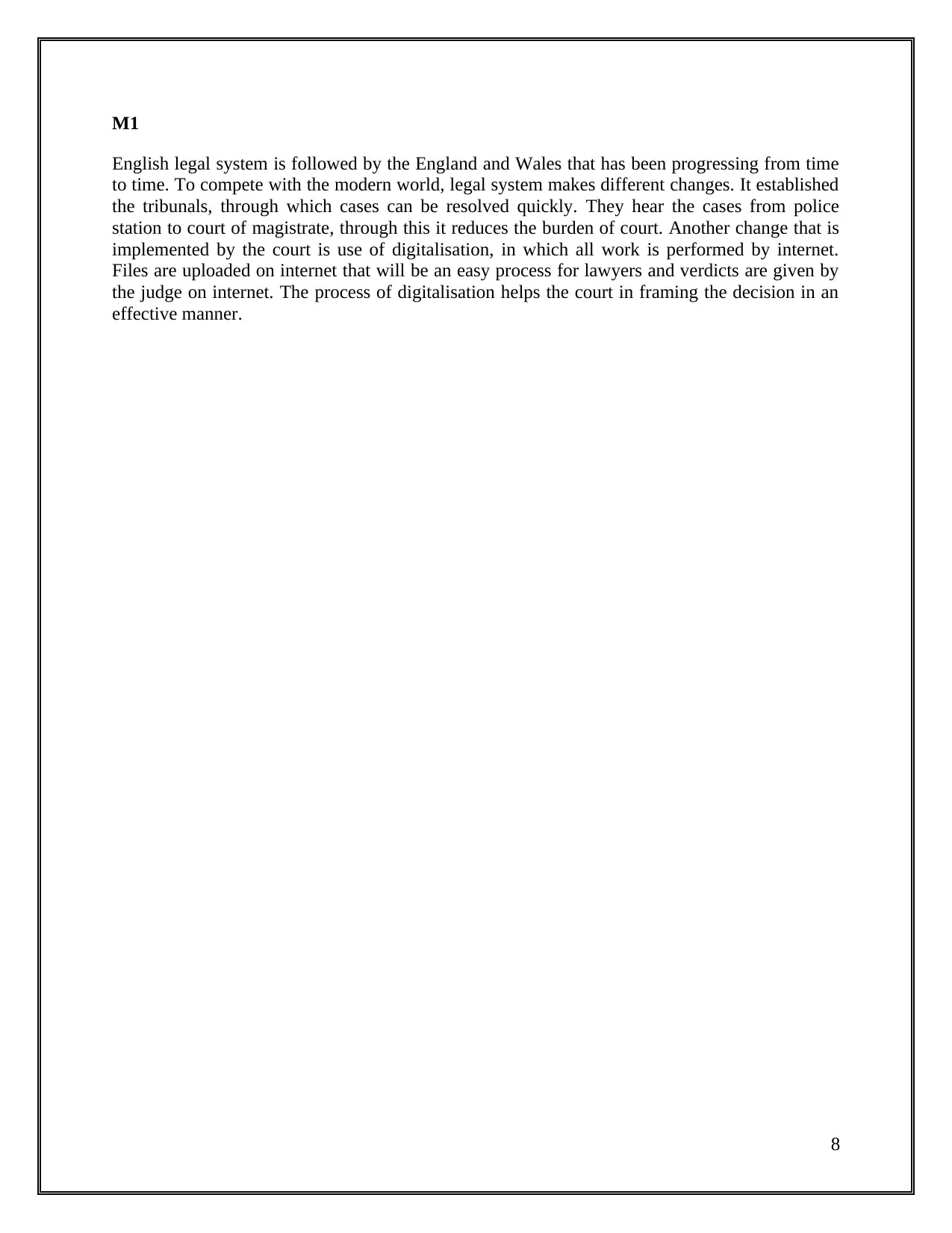
M1
English legal system is followed by the England and Wales that has been progressing from time
to time. To compete with the modern world, legal system makes different changes. It established
the tribunals, through which cases can be resolved quickly. They hear the cases from police
station to court of magistrate, through this it reduces the burden of court. Another change that is
implemented by the court is use of digitalisation, in which all work is performed by internet.
Files are uploaded on internet that will be an easy process for lawyers and verdicts are given by
the judge on internet. The process of digitalisation helps the court in framing the decision in an
effective manner.
8
English legal system is followed by the England and Wales that has been progressing from time
to time. To compete with the modern world, legal system makes different changes. It established
the tribunals, through which cases can be resolved quickly. They hear the cases from police
station to court of magistrate, through this it reduces the burden of court. Another change that is
implemented by the court is use of digitalisation, in which all work is performed by internet.
Files are uploaded on internet that will be an easy process for lawyers and verdicts are given by
the judge on internet. The process of digitalisation helps the court in framing the decision in an
effective manner.
8
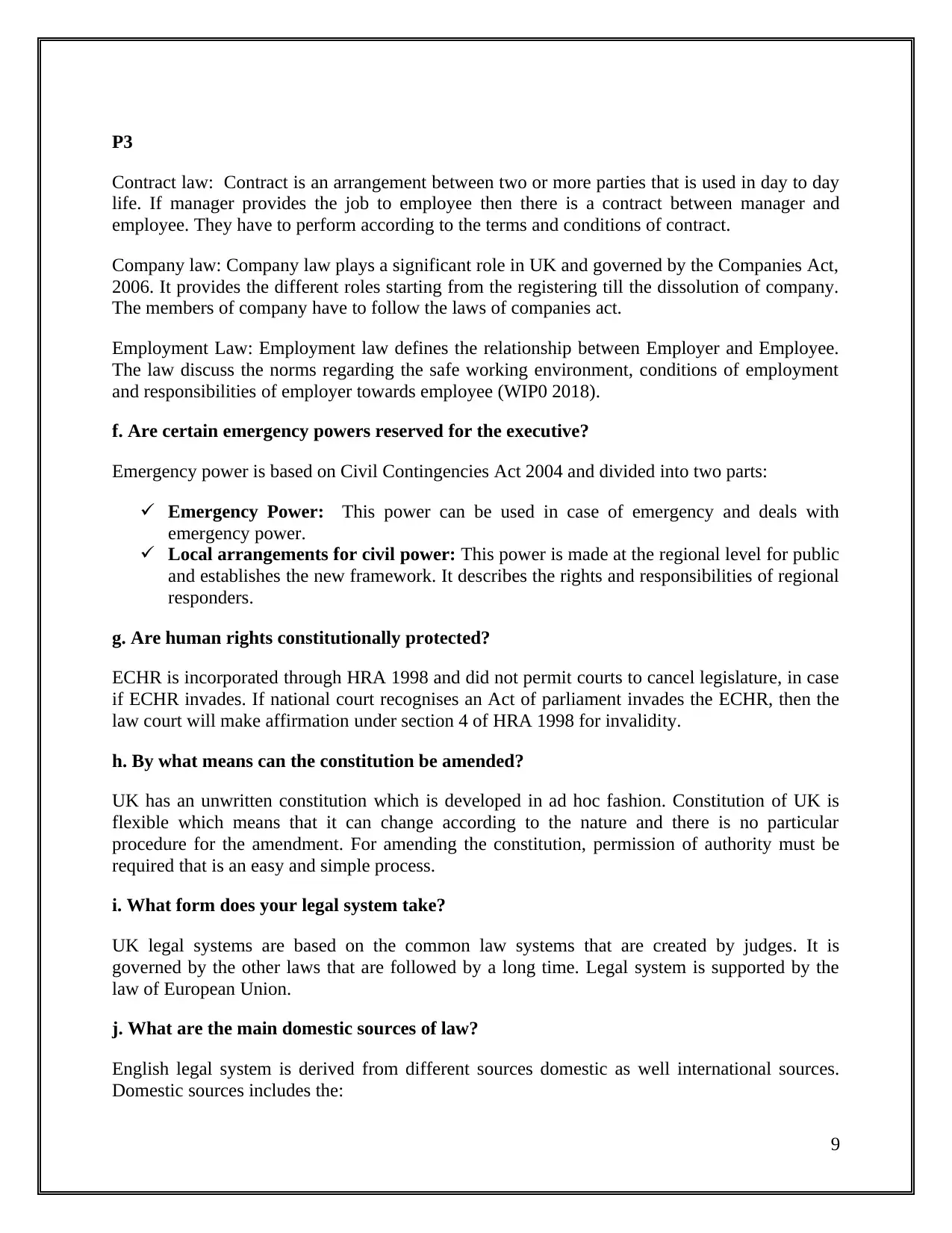
P3
Contract law: Contract is an arrangement between two or more parties that is used in day to day
life. If manager provides the job to employee then there is a contract between manager and
employee. They have to perform according to the terms and conditions of contract.
Company law: Company law plays a significant role in UK and governed by the Companies Act,
2006. It provides the different roles starting from the registering till the dissolution of company.
The members of company have to follow the laws of companies act.
Employment Law: Employment law defines the relationship between Employer and Employee.
The law discuss the norms regarding the safe working environment, conditions of employment
and responsibilities of employer towards employee (WIP0 2018).
f. Are certain emergency powers reserved for the executive?
Emergency power is based on Civil Contingencies Act 2004 and divided into two parts:
Emergency Power: This power can be used in case of emergency and deals with
emergency power.
Local arrangements for civil power: This power is made at the regional level for public
and establishes the new framework. It describes the rights and responsibilities of regional
responders.
g. Are human rights constitutionally protected?
ECHR is incorporated through HRA 1998 and did not permit courts to cancel legislature, in case
if ECHR invades. If national court recognises an Act of parliament invades the ECHR, then the
law court will make affirmation under section 4 of HRA 1998 for invalidity.
h. By what means can the constitution be amended?
UK has an unwritten constitution which is developed in ad hoc fashion. Constitution of UK is
flexible which means that it can change according to the nature and there is no particular
procedure for the amendment. For amending the constitution, permission of authority must be
required that is an easy and simple process.
i. What form does your legal system take?
UK legal systems are based on the common law systems that are created by judges. It is
governed by the other laws that are followed by a long time. Legal system is supported by the
law of European Union.
j. What are the main domestic sources of law?
English legal system is derived from different sources domestic as well international sources.
Domestic sources includes the:
9
Contract law: Contract is an arrangement between two or more parties that is used in day to day
life. If manager provides the job to employee then there is a contract between manager and
employee. They have to perform according to the terms and conditions of contract.
Company law: Company law plays a significant role in UK and governed by the Companies Act,
2006. It provides the different roles starting from the registering till the dissolution of company.
The members of company have to follow the laws of companies act.
Employment Law: Employment law defines the relationship between Employer and Employee.
The law discuss the norms regarding the safe working environment, conditions of employment
and responsibilities of employer towards employee (WIP0 2018).
f. Are certain emergency powers reserved for the executive?
Emergency power is based on Civil Contingencies Act 2004 and divided into two parts:
Emergency Power: This power can be used in case of emergency and deals with
emergency power.
Local arrangements for civil power: This power is made at the regional level for public
and establishes the new framework. It describes the rights and responsibilities of regional
responders.
g. Are human rights constitutionally protected?
ECHR is incorporated through HRA 1998 and did not permit courts to cancel legislature, in case
if ECHR invades. If national court recognises an Act of parliament invades the ECHR, then the
law court will make affirmation under section 4 of HRA 1998 for invalidity.
h. By what means can the constitution be amended?
UK has an unwritten constitution which is developed in ad hoc fashion. Constitution of UK is
flexible which means that it can change according to the nature and there is no particular
procedure for the amendment. For amending the constitution, permission of authority must be
required that is an easy and simple process.
i. What form does your legal system take?
UK legal systems are based on the common law systems that are created by judges. It is
governed by the other laws that are followed by a long time. Legal system is supported by the
law of European Union.
j. What are the main domestic sources of law?
English legal system is derived from different sources domestic as well international sources.
Domestic sources includes the:
9
⊘ This is a preview!⊘
Do you want full access?
Subscribe today to unlock all pages.

Trusted by 1+ million students worldwide
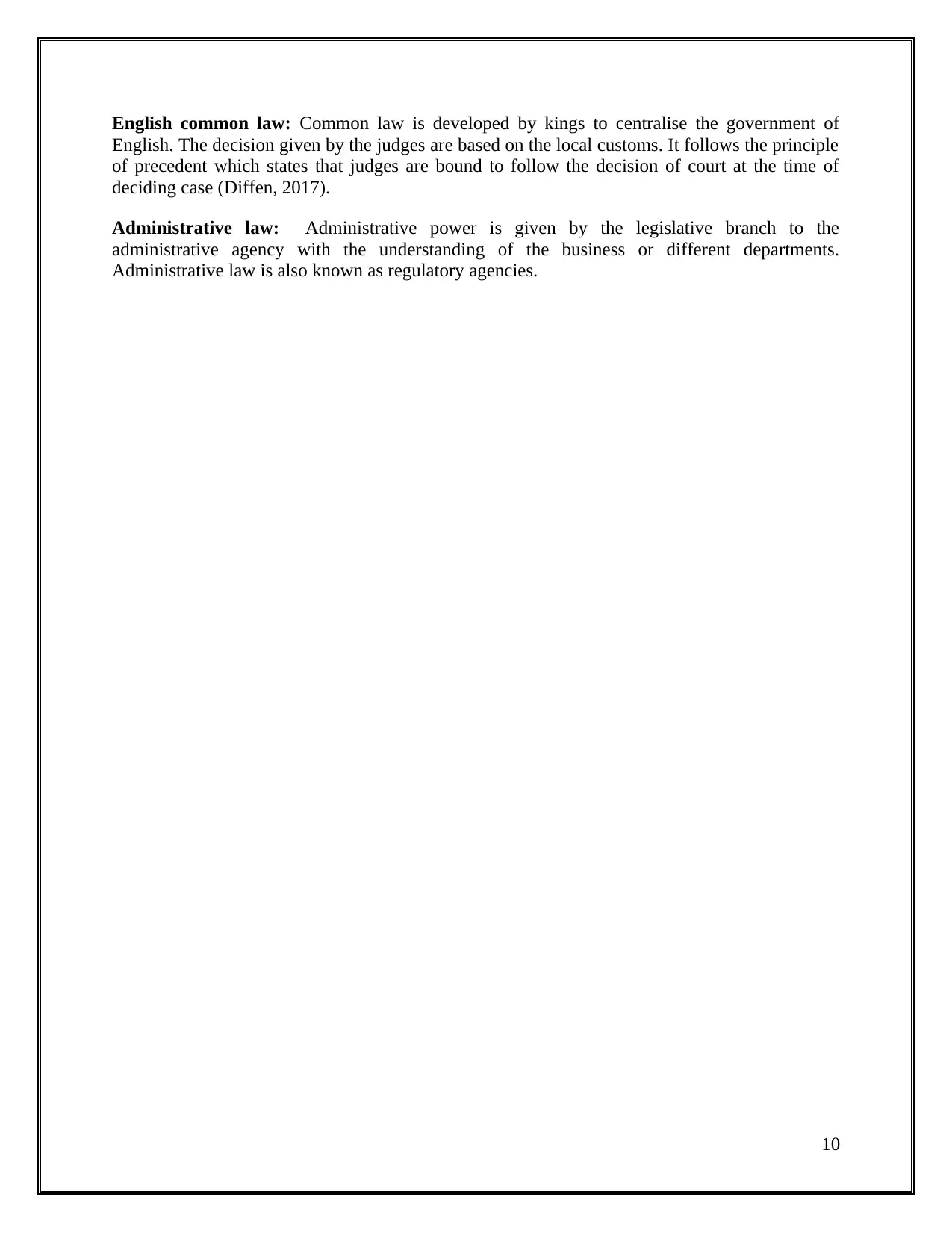
English common law: Common law is developed by kings to centralise the government of
English. The decision given by the judges are based on the local customs. It follows the principle
of precedent which states that judges are bound to follow the decision of court at the time of
deciding case (Diffen, 2017).
Administrative law: Administrative power is given by the legislative branch to the
administrative agency with the understanding of the business or different departments.
Administrative law is also known as regulatory agencies.
10
English. The decision given by the judges are based on the local customs. It follows the principle
of precedent which states that judges are bound to follow the decision of court at the time of
deciding case (Diffen, 2017).
Administrative law: Administrative power is given by the legislative branch to the
administrative agency with the understanding of the business or different departments.
Administrative law is also known as regulatory agencies.
10
Paraphrase This Document
Need a fresh take? Get an instant paraphrase of this document with our AI Paraphraser
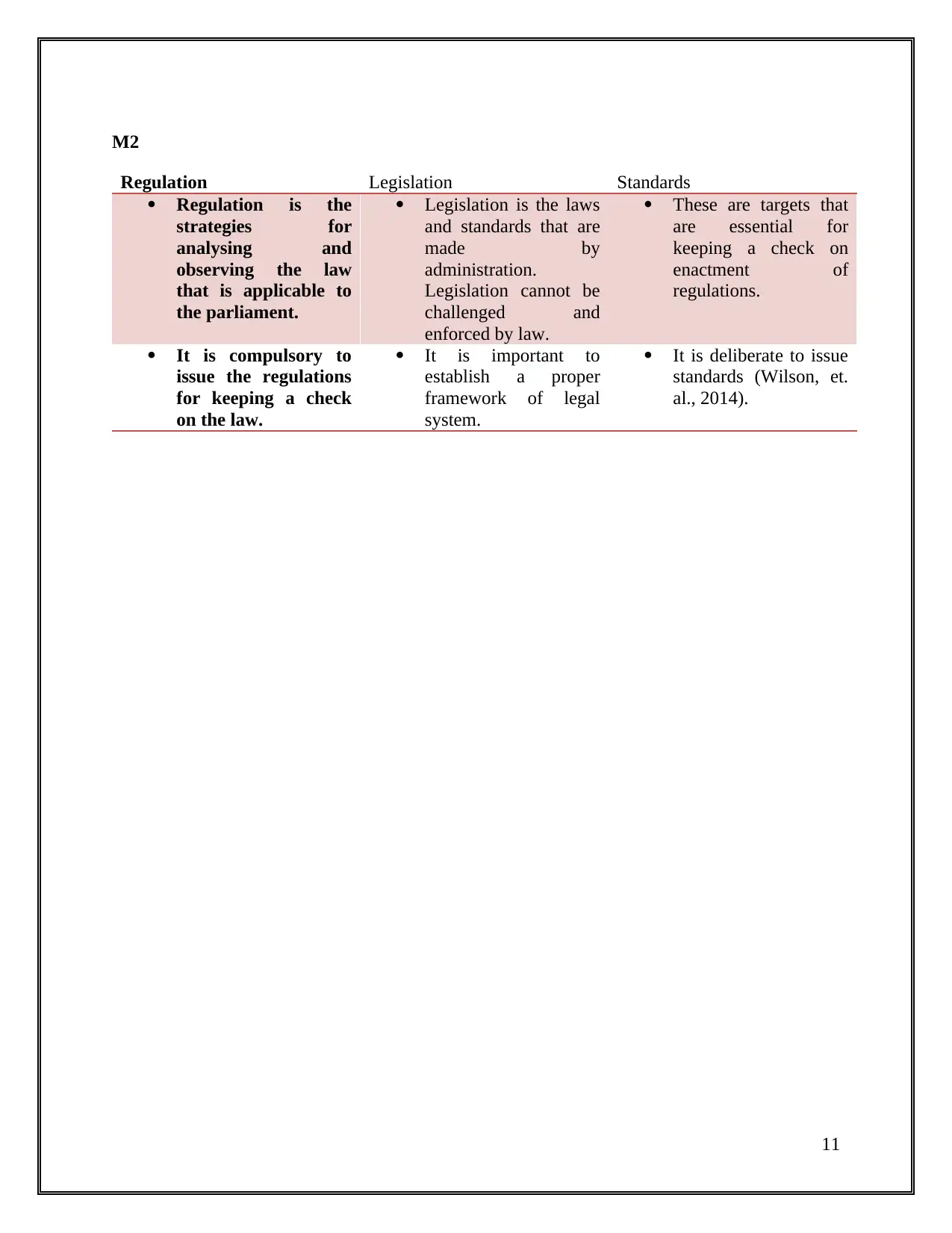
M2
Regulation Legislation Standards
Regulation is the
strategies for
analysing and
observing the law
that is applicable to
the parliament.
Legislation is the laws
and standards that are
made by
administration.
Legislation cannot be
challenged and
enforced by law.
These are targets that
are essential for
keeping a check on
enactment of
regulations.
It is compulsory to
issue the regulations
for keeping a check
on the law.
It is important to
establish a proper
framework of legal
system.
It is deliberate to issue
standards (Wilson, et.
al., 2014).
11
Regulation Legislation Standards
Regulation is the
strategies for
analysing and
observing the law
that is applicable to
the parliament.
Legislation is the laws
and standards that are
made by
administration.
Legislation cannot be
challenged and
enforced by law.
These are targets that
are essential for
keeping a check on
enactment of
regulations.
It is compulsory to
issue the regulations
for keeping a check
on the law.
It is important to
establish a proper
framework of legal
system.
It is deliberate to issue
standards (Wilson, et.
al., 2014).
11
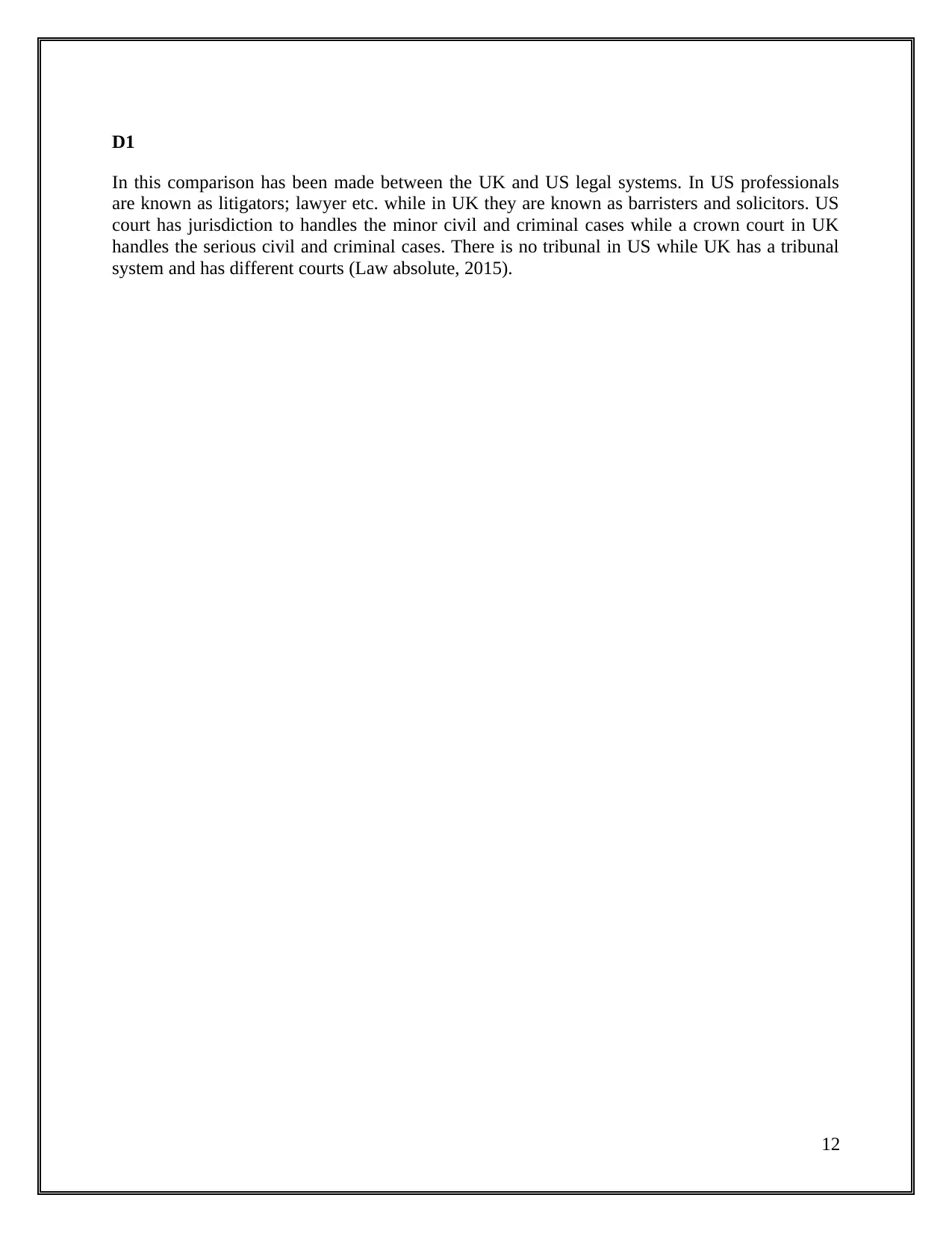
D1
In this comparison has been made between the UK and US legal systems. In US professionals
are known as litigators; lawyer etc. while in UK they are known as barristers and solicitors. US
court has jurisdiction to handles the minor civil and criminal cases while a crown court in UK
handles the serious civil and criminal cases. There is no tribunal in US while UK has a tribunal
system and has different courts (Law absolute, 2015).
12
In this comparison has been made between the UK and US legal systems. In US professionals
are known as litigators; lawyer etc. while in UK they are known as barristers and solicitors. US
court has jurisdiction to handles the minor civil and criminal cases while a crown court in UK
handles the serious civil and criminal cases. There is no tribunal in US while UK has a tribunal
system and has different courts (Law absolute, 2015).
12
⊘ This is a preview!⊘
Do you want full access?
Subscribe today to unlock all pages.

Trusted by 1+ million students worldwide
1 out of 21
Related Documents
Your All-in-One AI-Powered Toolkit for Academic Success.
+13062052269
info@desklib.com
Available 24*7 on WhatsApp / Email
![[object Object]](/_next/static/media/star-bottom.7253800d.svg)
Unlock your academic potential
Copyright © 2020–2026 A2Z Services. All Rights Reserved. Developed and managed by ZUCOL.




